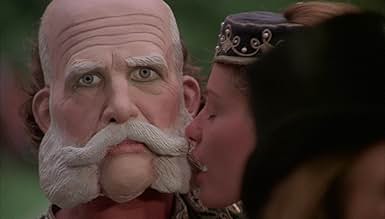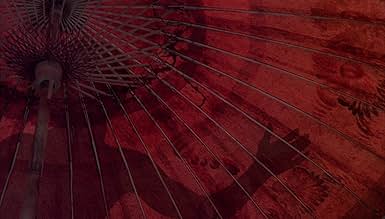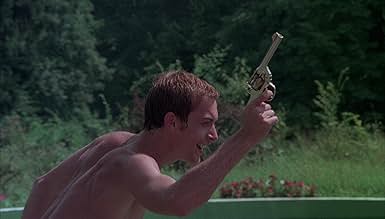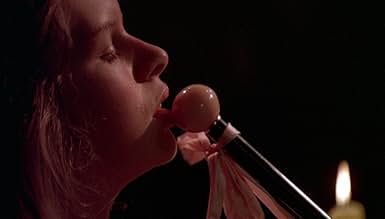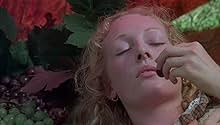Füge eine Handlung in deiner Sprache hinzuPrince Rudolf, heir to the throne of the Austro-Hungarian Empire, deliberately provokes his father, Kaiser Franz Joseph, by his dissolute and feckless behaviour. His defiance of the Kaiser's... Alles lesenPrince Rudolf, heir to the throne of the Austro-Hungarian Empire, deliberately provokes his father, Kaiser Franz Joseph, by his dissolute and feckless behaviour. His defiance of the Kaiser's rigid adherence to duty and the good of the empire leads to a tragic confrontation betwee... Alles lesenPrince Rudolf, heir to the throne of the Austro-Hungarian Empire, deliberately provokes his father, Kaiser Franz Joseph, by his dissolute and feckless behaviour. His defiance of the Kaiser's rigid adherence to duty and the good of the empire leads to a tragic confrontation between power and hedonism at the Mayerling hunting lodge.
- Auszeichnungen
- 1 Nominierung insgesamt
- Marie von Vetsera
- (as Therese Ann Savoy)
Empfohlene Bewertungen
Typically for Jancso', there is very little to relate plot-wise: as a matter of fact, this can be seen as simply an erotic fantasia on the infamous Mayerling affair in which the heir to the Austro-Hungarian empire, the Archduke Rudolph, carried out a suicide pact with his mistress. According to Jansco' and his regular Italian screenwriter Giovanna Gagliardo, however, the events were not so clear-cut. Although the film never strays from the Prince’s country estate, Jancso'’s realization of 19th Century Vienna is as visually sumptuous and technically elaborate as expected while the political subtexts as they relate to our modern age are equally important. Although this is the first film I’ve watched myself which dealt with this particular historical incident (there have been countless others over the years, with Anatole Litvak’s 1936, Max Ophuls’ 1940 and Terence Young’s 1968 versions being the best-known), it’s safe to assume that PRIVATE VICES AND PUBLIC VIRTUES is unlike any of them. For starters, most of the film’s running time is devoted to a marathon orgy to which the Archduke invites the younger generation of Austrian aristocrats to spite his father Emperor Franz-Joseph (a mask of whom is donned by several of the revelers). Apparently, a coup to overthrow the monarch had already failed and, consequently, the Archduke retired to his Mayerling estate to live a life of hedonistic abandon. Knowing full well that his family disapproved of his scandalous behavior, he further intends to shock the establishment by photographing the guests in flagrante and sending a copy out to his peers, thus exposing the veiled degeneracy of the ruling class. Ultimately, however, court officials present themselves at the gates of Mayerling to put a stop to the bacchanalian excesses…
The three main protagonists of the film are the Archduke, his stepbrother and stepsister who, forming an inseparable and incestuous ménage-a'-trois, are soon joined by an equally libertarian hermaphrodite when a circus troupe stops by the mansion. Having disposed of his boringly proper wife early on, the Archduke falls in love with this newest addition to his inner circle. Left alone after the guests have been dispersed, apprehended or executed (off-screen), the four lovers are ominously shrouded in white sheets like corpses during their final open-air rendezvous: an oppressively melancholy mood makes itself felt towards the end, aided immeasurably by Francesco De Masi’s lovely mournful score. The officials, ostensibly there to put a stop to the offending proceedings and arrest the Archduke, mostly stand around befuddled not knowing how to cope with the extraordinary situation – but their ultimate reaction is swift and abrupt, leading to an inspired slow-motion finale depicting the royal funeral procession.
Among the cast list, there were only three names that I recognized: the formidable Laura Betti (who as the loving nanny performs a handjob on her royal charge laying about in the hay!), Theresa Ann Savoy (she plays the crucial role of the hermaphrodite here and would later be equally central to Tinto Brass’ infamous CALIGULA [1979]) and Ilona Staller (adopting the evocative stage name of Cicciolina, she later became a highly popular porn star and, later still, an Italian MP – but, ironically, she is here wasted in the thanklessly chaste bit of the Archduke’s wife!). Although there is much full-frontal nudity involved, the only time it really approaches hardcore territory is the afore-mentioned scene with Betti – unless one wants to count the brief instances of bestiality when some of the guests decide to get it on with a few runaway turkeys!! Typically for Jancso', his characters resort to much communal dancing and game-playing – which is here joined by the improbably effective singing of English childhood ditties (including “Baa-Baa-Black Sheep”)! The sparse original music, then, has been mingled with classical pieces – notably Strauss’ “The Blue Danube” – and, appropriately enough, a handful of military marches.
I suppose that, for the uninitiated, all of the above would seem pointlessly perverse and terminally tedious but, stylistically, the film was something of a new departure for Jancso': while the intermittently creative editing (with especially notable use of ellipses) and his trademark long sequence-shots are still in evidence, he reportedly utilized 343 shots here as opposed to the lowly two digit figures of earlier works. On the downside, the video presentation is a bit dodgy at first: an obviously unrestored print has been utilized for the transfer (albeit uncut, as proudly announced on the sleeve of the Italian R2 DVD) but is still acceptable enough for its velvety cinematography and extreme handsomeness to shine nonetheless; the layer change, however, is quite roughly handled (at least by the Pioneer model I watched it on).
But, for some -'in the know'- it is a historical allegory reinterpreting the real-life "Mayerling affair," in which the Austro-Hungarian Crown Prince Rudolph and his mistress, the Baroness Maria Vetsera, committed suicide at the family hunting lodge, Mayerling, because they were not allowed to marry. The official records of the deaths were long hidden, then destroyed and the public's imagination was captured for decades to come with the mysteries surrounding the love/political affairs of the ruling society.
The film director Jancsó, having long artistic controversies of his own, suggests that contrary to this official version, the lovers were indeed assassinated by his father, Emperor Franz Josef. Rudolph and his friends were in direct opposition with the world of the Emperor on many issues and used plots to convince him that his time was past, and that it was now the moment to allow the Young&New to rise to power. Some of those plots consisted of attracting the youth of the best families in the Austro-Hungarian Empire to their castle involving them in giant orgies. Photographs were taken during these orgies and sent to the Emperor, in order to blackmail him and convince him to let the new order rule (?!). After the soldiers -led by the Austrian secret police- shot the couple, their corpses were arranged suggesting a romantic suicide pact-to avoid scandal or radical overthrow of a society obsessed with image.
In this movie, Jancsó is inventing a 'real story' in order of translating the complexities of the realities of repression and freedom into images. In it he replaces a romantic cliché with a modern politicized take on a particularly tormented historical period, but his visual language's coding brings forth the controversy that rendered this piece of his art to obscurity. The explicit use of nudity and erotic encounters of all kinds seems to be concealing the message of aspiring political freedom from an initial and superficial glance. The use of nudity is a recurrent visual element in Jancsó's art, but, while in his earlier works it was a symbol of humiliation, now it is a sign of liberation and he goes much farther than that. The mix of both sexes in wild celebration of nakedness and sex in a state of joy and ecstasy is an expression of rebellion and free will. This is in contrast with the attitudes of those in power, who seem to want to cover every inch of flesh with as many layers as possible and every act of life with prude social contacts ('In MY family, we do not have sex!'). This revolution replaces the unnatural uniforms of the army and clergy with natural uniformity of the nakedness of all-beautiful young bodies, and the highly coded social behavior with spontaneous sexuality. This alone indeed, often places the unprepared spectator at certain unease.
Due to contractual terms, Jancsó enjoyed less than usual artistic freedom that shows up as discontinuity with both, his previous and later works when it comes to editing, using of music and photography. Despite these minor artistic flaws, the film remains a powerful work, reflecting on youth movements that attempted revolutions in the 60s and 70s' Western World, bearing signs of knowing what they did not want-but being not sure of what to replace them with. Jancsó proves himself to be a lucid analyst not only of history but also of modern society. The young in this film are mistaken by hoping to make their voices heard, as silence and conformance with the social order is to be maintained by those in power - regardless the arbitrary nature of this order. One can argue that the mock-rituals of the Crown Prince are as legitimate as the Imperial etiquette, but a revolution without proper preparation is doomed to failure.
In summary, 'Vizi privati, pubbliche virtú' is a sorrowful meditation on the limits of a revolution that failed to come to life, not a pretentious porno flick - as an unperceptive observant would judge it to be. The question is ours now to answer: 'Is our society -and we ourselves- are so far removed from the puritanical world of the Austro-Hungarian Emperor Franz Josef and his obsessively clean image? '
I saw this film at Essex University in 1977 and have never had the chance to see it since.Where could I see this again?
Wusstest du schon
- WissenswertesThis movie avoids any reference or mention of Crown Prince Rudolf's mother Empress Elisabeth, due to her near saint-like status in Hungary.
- Crazy CreditsAfter the last on-screen credit, the camera follows the funeral procession, in slow motion, for a full minute.
- VerbindungenReferenced in Rewind This! (2013)
- SoundtracksBaa Baa Black Sheep
Traditional nursery rhyme
Top-Auswahl
- How long is Private Vices, Public Virtues?Powered by Alexa
Details
- Laufzeit1 Stunde 44 Minuten
- Sound-Mix
- Seitenverhältnis
- 1.85 : 1
Zu dieser Seite beitragen


